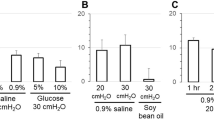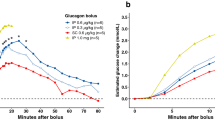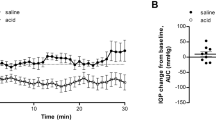Abstract
PANCREOZYMIN and cholecystokinin (PZ/CCK) preparations are known to depress the motility1 of both intact stomachs and denervated gastric pouches. It has been claimed that these preparations depress gastric acid secretion2, and it is possible that they either are or contain enterogastrone.
This is a preview of subscription content, access via your institution
Access options
Subscribe to this journal
Receive 51 print issues and online access
$199.00 per year
only $3.90 per issue
Buy this article
- Purchase on Springer Link
- Instant access to full article PDF
Prices may be subject to local taxes which are calculated during checkout
Similar content being viewed by others
References
Johnson, L. P., and Magee, D. F., Nature, 207, 1401 (1965).
Gillespie, I. E., and Grossman, M. I., Gut, 5, 342 (1966).
Jorpes, E., and Mutt, V., Acta Physiol. Scand., 66, 196 (1966).
Author information
Authors and Affiliations
Rights and permissions
About this article
Cite this article
MAGEE, D., NAKAMURA, M. Action of Pancreozymin Preparations on Gastric Secretion. Nature 212, 1487–1488 (1966). https://doi.org/10.1038/2121487a0
Issue Date:
DOI: https://doi.org/10.1038/2121487a0
This article is cited by
-
Excitation of acid and pepsin secretion by cholecystokinin-pancreozymin in Pavlov and Heidenhain pouches of the rat
Experientia (1975)
-
Cholecystokinin (CCK)
Klinische Wochenschrift (1970)
-
Effect of Pancreozymin Preparations on Gastric Secretion
Nature (1967)
Comments
By submitting a comment you agree to abide by our Terms and Community Guidelines. If you find something abusive or that does not comply with our terms or guidelines please flag it as inappropriate.



